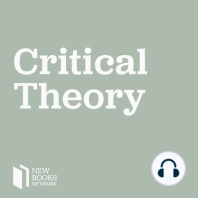71 min listen

Daniel Tutt, "How to Read Like a Parasite: Why the Left Got High on Nietzsche" (Repeater, 2024)
Daniel Tutt, "How to Read Like a Parasite: Why the Left Got High on Nietzsche" (Repeater, 2024)
ratings:
Length:
53 minutes
Released:
Mar 12, 2024
Format:
Podcast episode
Description
A how-to guide for the left on how to overcome Nietzsche's divisive and damaging influence.
How to Read Like a Parasite: Why the Left Got High on Nietzsche (Repeater Books, 2024) overturns the whitewashed and defanged version of Nietzsche that has been made popular by generations of translators and academic philosophers who have presented his work as apolitical and without a core reactionary agenda. The central argument of the book is that Nietzsche’s philosophy does have a center, and that the left learns a great deal from Nietzsche when we read him as driven by a highly sophisticated reactionary political vision that informs all his major concepts and ideas. The most important Nietzschean concepts — from perspectivism, ressentiment, eternal return to the pathos of distance — are analyzed in the historical context in which Nietzsche lived and wrote, and several case-studies of prominent left-Nietzscheans from Jack London, Gilles Deleuze, Wendy Brown to Huey Newton are discussed. How to Read Like a Parasite makes a persuasive case for how we can overcome Nietzsche’s damaging influence on the left, showing us how to read and understand his work without becoming victims of it.
Learn more about your ad choices. Visit megaphone.fm/adchoices
Support our show by becoming a premium member! https://newbooksnetwork.supportingcast.fm/critical-theory
How to Read Like a Parasite: Why the Left Got High on Nietzsche (Repeater Books, 2024) overturns the whitewashed and defanged version of Nietzsche that has been made popular by generations of translators and academic philosophers who have presented his work as apolitical and without a core reactionary agenda. The central argument of the book is that Nietzsche’s philosophy does have a center, and that the left learns a great deal from Nietzsche when we read him as driven by a highly sophisticated reactionary political vision that informs all his major concepts and ideas. The most important Nietzschean concepts — from perspectivism, ressentiment, eternal return to the pathos of distance — are analyzed in the historical context in which Nietzsche lived and wrote, and several case-studies of prominent left-Nietzscheans from Jack London, Gilles Deleuze, Wendy Brown to Huey Newton are discussed. How to Read Like a Parasite makes a persuasive case for how we can overcome Nietzsche’s damaging influence on the left, showing us how to read and understand his work without becoming victims of it.
Learn more about your ad choices. Visit megaphone.fm/adchoices
Support our show by becoming a premium member! https://newbooksnetwork.supportingcast.fm/critical-theory
Released:
Mar 12, 2024
Format:
Podcast episode
Titles in the series (100)
Lynne Huffer, “Are the Lips a Grave? A Queer Feminist on the Ethics of Sex” (Columbia University Press, 2013): In her fourth book, Lynne Huffer argues for a restored queer feminism to find new ways of thinking about sex and about ethics. Are the Lips a Grave? A Queer Feminist on the Ethics of Sex (Columbia University Press, by New Books in Critical Theory